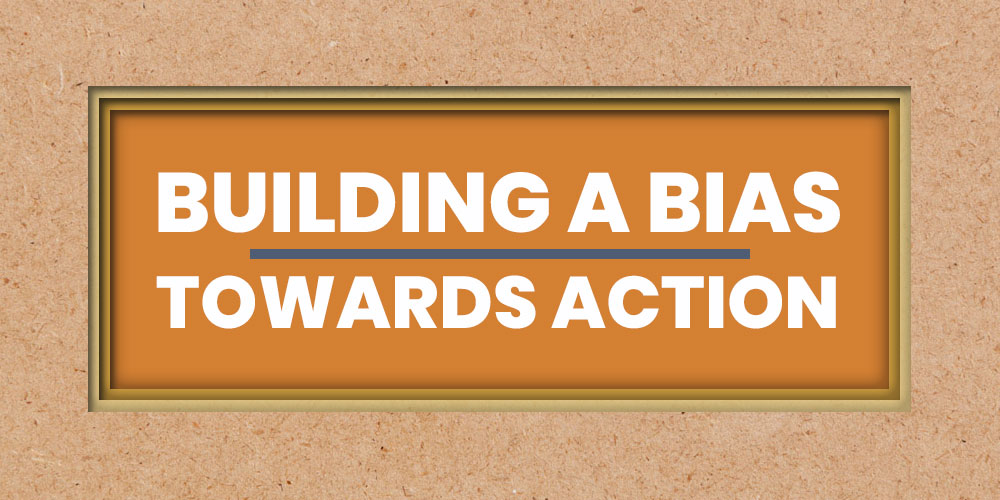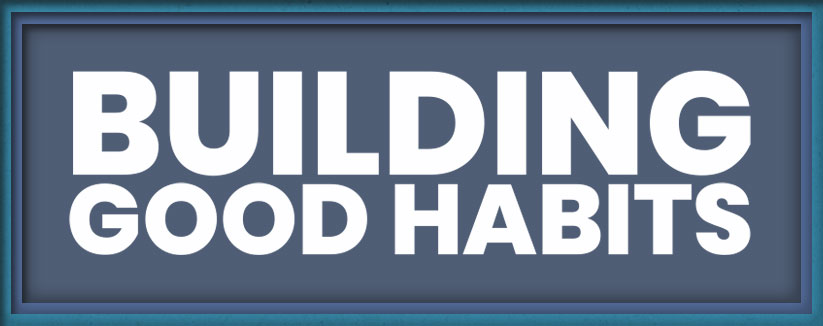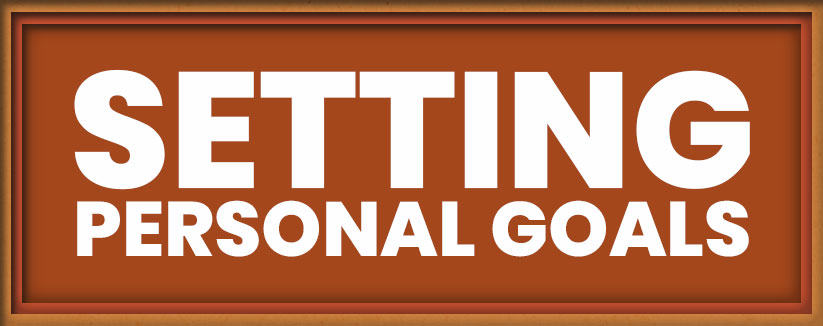 What if you were the kind of person who just went for it? The person who had a bias towards action and just got things done. The kind of person who took that leap to start a business, sat down to write that book or walked right up to that cute girl/guy and asked for their number.
What if you were the kind of person who just went for it? The person who had a bias towards action and just got things done. The kind of person who took that leap to start a business, sat down to write that book or walked right up to that cute girl/guy and asked for their number.
Whatever you’ve been dragging your feet on, getting started can be challenging. It’s so easy to procrastinate and do it later. You wait for the right time. You want to get it perfect before you share it. Sometimes you don’t even know where to start!
Bias Towards Action Meaning:
Having a bias towards action means developing a habit where you promptly take action by making decisions quickly and setting aside common roadblocks.
Why Is a Bias Towards Action Important?

Forward movement toward your goals as your default pattern is a huge asset. It is easy to put something off until later or wanting more information to make a decision. However, those uncertainties come at a major expense and the data supports that. Studies have shown that those who are more likely to move towards action were many times more successful than their peers.
I’ve seen firsthand how those who move to action quickly are the winners. I’ve lost count on the number of people who came to me with big aspirations and failed miserably, not because of lack of skill, knowledge or aptitude, but because they didn’t even take the first step.
If you’re willing to take some calculated risks and just start, you will win big in many areas. You’ll stop procrastinating, you’ll be more successful, you’ll feel happier, earn more money, get the girl/guy you dreamed of and take your life to places you never thought possible. This may seem like a fantastical claim, but standing on this side of building a habit of going for it, I can tell you it’s incredibly possible.
Having a propensity to just go for it can help with something I call “what ifs”. These are things that will haunt you on your deathbed when you think back and say “what if I had the courage to say I loved them”, “what if I had taken that job across the country”, or “what if I pushed myself a little harder”.
What ifs are toxic forces in life: a combination of dreams deferred and haunting regrets. Between being successful in life and being filled with regrets, it’s an obvious choice. All we need to do is step up and take life by the horns.
How To Develop a Bias Towards Action

Getting started won’t be easy, we are going to feel uncomfortable and resist this change. It’s easy to be lazy, to say I’ll do it tomorrow. What is difficult, though, is getting up and doing the work right now. If we want to be the best we can be and get things accomplished, it only happens one way. That happens through acting like a person who is all those things.
 Over time we want to build a habit of setting aside all our excuses and moving forward even without a perfect plan or all the information. In order to do that, we need to understand that building a habit of action centers around being decisive.
Over time we want to build a habit of setting aside all our excuses and moving forward even without a perfect plan or all the information. In order to do that, we need to understand that building a habit of action centers around being decisive.
There are times in life where there is one single right answer, but more often than not, there are no good answers. No amount of information gathering, expertise, or having the right circumstance will lead you to the one true answer, because it doesn’t exist.
What are we supposed to do when, more often than not, we don’t have all the information to move forward? Understand that at some point we need to move forward regardless. That requires us to be decisive, quickly formulating the best plan of action we can, then getting on with it.
Becoming More Decisive

Making a decision quickly is sometimes hard, we don’t always have perfect data and we may not know the best way forward. A lack of decisiveness usually stems from fear; fear of failure, fear of looking stupid, or fear of our peers perceiving us in a negative way.
This fear is often masked by our subconscious and called many things. We might feel shame, embarrassment, or something else deep in our minds that causes us to hesitate from just going for it. The first step is to recognize the fear and name it.
When you feel yourself holding back from taking the leap on something, ask yourself, why that is? Some of the best decisions I’ve made in my life involved me hesitating around some fear and then understanding that fear. In most cases, just seeing my hesitations as fear allowed me to overcome that mental block.
Owning our fears allows you to at least be honest with yourself about why you’re not going for it. Without that understanding we will waste time pointing fingers at all sorts of reasons why we don’t move forward. At least now we know what the real reason is and from there, we can work through it.
It is at this point we have a choice: we can start or we can be stagnant. If there is a change in our life that we want, no amount of hoping will cause it to manifest, it is through action that we can make it happen.
Starting Badly

Giving yourself the grace to start badly is an important step. No one likes to fail, particularly in front of others, but it’s an important part of the process that we need to get over. Being willing to take that first step with the understanding that we are just at the beginning and will have missteps is an important mindset to adopt.
When starting something new, we need to understand that there will be many failures and that’s okay. The interesting thing is if we make our best guess and try, two things can happen: we succeed or we fail. If we move toward action and succeed, we achieve our goal in way less time. If we fail, we suddenly have a lot more information about the problem than we did before and often become wiser much sooner.
A good example of this was when I wanted to try my hand at writing a fiction book. I’ve now written 6 books[Link To Store], but they all were non-fiction, so fiction was a totally new thing that surrounded me with anxiety. I had spent so many years reading some of the best fiction humanity has produced, how could I stack up?
By starting badly was my answer.
To do this, I sat down and started with some short stories to see what shook out. I then took those short stories and went to a writing group, where my writing was politely ripped to shreds. I licked my proverbial wounds and started again; this time much wiser.
Adopting The Right Mindset

Many people get tied up in all the things that can go wrong, putting a ton of pressure on themselves. I see people put so much pressure on themselves to succeed. One good approach that I’ve come to adopt is framing things not as a dramatic start, but as a hypothesis we are testing.
In science you’ll come up with an idea and then test it, study the results, then formulate an updated approach to test further. This was how a friend explained to me how he started new businesses.
He laid out a few ideas that he was considering and he would test out each idea in some small way. In many cases he’d only take a few steps and realize a critical flaw. He could either adjust it in a meaningful way or eliminate it for one of his other tests.
I’ve since adopted a similar strategy and it’s helped me relieve a lot of the stress of potential failure. When people are asking what I’ve been up to I’ll say something like “I’m exploring these three new options right now to see if one of them has potential.”
This lets me adopt a curious mindset where failure is just a result, not some judgement passed on me. It also helps manage expectations of others by making it clear that we don’t have the answers… yet.
For this approach to work, you’ll need to set some bumpers up to keep you honest to the process. An important part of this approach is outlining the items you are going to test, how you can test them in small ways and finally what criteria you’ll use to either pivot to move forward or make the decision to stop.
The temptation with this approach is to try all of your ideas in an uncoordinated fashion. I work to narrow down to a short list, then figure out what’s the smallest action I could take to see if I can break it. Finally, I set some rules upfront before I start to guide me when to keep going or to move on to something else.
Understanding You Need To Do The Work


There are times we wish we could wave a magic wand and we have all that dreamed of. But that is not real life, so get over it. The only thing that will get you from where you are today to where you want to be is to put in the work to make it happen.
I talk about this a lot in my goals post (link to goals post), but realizing you need to take responsibility for improving your life is critical to getting where you hope to be. Taking ownership over our future, setting a plan and executing each day will make it happen.
Sitting on the couch wishing you had something only results in people being bitter over the things they weren’t willing to make happen. Don’t fool yourself, get out and do the work.
Understanding Locus Of Control


In psychology there is a concept called “locus of control” which helps us foster a bias towards action. Locus of control is an individual’s belief system regarding the factors to which that person attributes success or failure. If you have an internal locus, you believe your success and failures come from within you and are within your control. An external locus of control means that any successes or failures are attributed to outside of you.
Each person adopts a locus of control as their world view and to develop this bias, we need to shift our thinking to an internal locus of control. We control our destiny, our success, and our actions. Any change needs to come from within us and it will never happen unless we take action.
If we act like we control our destiny, that the source of our success (and failures) comes from within, the worst-case result will be that I believe what I do matters. The best-case scenario would be that I do have the control and I alter my trajectory of my life in a positive direction.
Stop Procrastinating And Get On With It


A big reason why people aren’t prone to getting certain things done is procrastination. The real challenge here is that it’s so easy to do! I’m sitting on my couch, Netflix has an endless amount of shows, we can order food direct to our door with one click of an app and homework or working on my work project can wait one more day.
None of those things are bad in and of themselves. It’s even fine to take some time to recharge after getting all the important work done. The problem is when we spend our time lazing about at the expense of our goals.
Building a better life for ourselves is difficult and it will only happen if we put in the work. Don’t fool yourself into thinking you can wish it into being. The people who have what you want put in the work to get it.
Read more on getting over procrastinating in my full post on that topic:
Mitigating Failures And Catastrophes


I think it’s important to call out the elephant in the room: if we are moving to action all the time, our failure rate is most likely going to rise with it. While we do want to move to action quickly, we also want to lessen the impact of failures, avoid them where we can, and prevent catastrophic failures.
Failures are generally fine, except when they disrupt your ability to meet your basic needs or compromise you in a way that would be ruinous. I like to make the distinction of being assertive e, but not reckless.
Earlier on I mentioned that we are often going to have to start with imperfect information, to start badly in order to get us off the starting line. One critical step to this is identifying disastrous threats that you may encounter and building boundaries around them.
This typically falls into a few categories:
- Spending above a certain budget
- Taking on debts or other liabilities
- Compromising current income sources
- Exposure to legal actions: criminal or civil
- Crossing a moral or ethical standard
- Not respecting important relationships
I want to be willing to face my fears of failure in order to move ahead, but I also need to know where to draw hard lines. If we are reckless, we can put ourselves in a bad place. If we get clear on the necessary standards to ensure we have our basic needs, we operate in a way that’s aligned with our own ethics and have the ability to be smart about not taking needless risks. Thus, we can avoid the major pitfalls.
In some cases, these guidelines will be a natural stopping point for consideration. Spending money is something that can be perfectly fine if done within a reasonable budget and within our means. There have been many times when I decide I want to try something and set aside $1,000 for exploration purposes. . There have been other times when I started and realized my budget wasn’t enough. This created a natural stopping point for me to consider if I can or should allocate more funds.
If I’m pushing forward, but realize that pursuing this action will impact people I care about, I know I need to have a conversation with them. For example, I wanted to move to Croatia for a few months. There were several people in my life that I had to have conversations with to make sure I wouldn’t damage those relationships. In the end they were simple conversations that didn’t take much time, but necessary to have. A few days later I was on a plane to Croatia.
Think about what your critical areas of failure are, the ones that would be serious if a failure occurred around them, then develop a process to make sure when you charge ahead, you’re not setting yourself up for a disaster. Doing this ahead of time and developing a quick checklist will allow you to move quickly but still mitigate major failures.
Common Things That Prevent You From Starting


A large part of my adoption of forward momentum comes from my Mother. She has worked a lot in hospice, listening to the words of the dying. Their regrets almost always revolved around things they wished they had done. I don’t want to be on my deathbed and think back to all the things I said I’d do “someday.”
Don’t be that person who has a long list of regrets. Push and push hard.
Too often we get caught up in trying to figure out the best way to do something, we may feel like we don’t know enough to start or we are afraid of failure. Analysis Paralysis is a real thing and if you’re reading this, it’s probably holding you back.
Waiting For The Perfect Time


Let’s get this out of the way, it will never be the perfect time. In fact, it will often be a really bad time to start. Being a person who’s decisive and gets stuff done means setting aside all of the excuses and making it happen. As you do this more and more, you’ll learn to manage the factors that make the timing poor and be successful despite them.
The saying goes, the best time to plant a tree is 50 years ago, the second-best time is right now.
Being a full-time professional blogger for over a decade now, I have received a lot of questions about getting started. People worry they don’t know how to do things, they aren’t good at writing, things are busy in their lives or careers, the list is endless.
My advice has always been to start now so you can get your biggest failures out of the way. If the right time does come around, you’ll be that much more prepared to take advantage of it. If “the right time” never does come around, you’ve started anyway and probably figured out how to make it all work out regardless.
Life is always going to be busy, conditions are never going to be perfect,, and time will always be short. Figure out your priorities in life and realize that you make time for the things that are important. If this new thing is important to you, you’ll figure out a way.
Perfectionism


There is a common desire to get things perfect when you’re just starting out building this habit. We want to give it the attention it deserves and we want our work to be a good reflection of ourselves. Whatever the reason, understand that it will never be perfect no matter how long you spend on it.
What I have learned over the years is that often putting out a “good enough” version is a huge advantage because not only does it shorten the time to starting, but it allows us to see where we might have made faulty assumptions, where the realities of life impede us, or some other factor comes to light.
A really great illustration of this is in developing products. For a long time, people would build products, working to refine it to get it just right. Then something funny happened; They started selling it, only to learn that what they made had a critical flaw, it wasn’t of interest to customers or otherwise fell flat.
From that, we’ve learned to develop what many call a “minimally viable product”, meaning getting a product to market that is good enough to have something to offer, but not fully built out. You’ll see that a software is in “beta”, maybe there is a limited run of a book or item, or there could be a crowd funding campaign before the product is even made. These are all minimally viable products.
The important thing to realize here is that if you can get to a place of action, you’re going to learn a lot. Your assumptions are challenged and you learn a great deal about what not to do. By starting in small ways, failing, then learning from those failures, we can actually get it “right” faster than if we tried to get “perfect”.
Things That Hold Us Back


We all have the same amount of time in the day, it’s totally equal. So why is it that some people seem to get a lot more accomplished than us? We will want to point to some reason why they had an advantage or we were at some disadvantage, but in reality, these are excuses.
Let me play devil’s advocate here for a moment. Let’s say these factors are real, that others have a huge advantage or you have some major disadvantage. You have a choice: let those things hold you back, or push through and make it happen anyway.
The difference is those who push forward will figure out ways to succeed despite their limitations. They will be stronger, wiser, tougher and more successful because of what held them back.
Those who let those things hold them back, will be stuck right where they are. They will be miserable because they feel cheated. They will be filled with deferred dreams and dissatisfaction for the rest of their lives. Do you want your life to be defined by such negative energy or would you rather overcome it?
There is no greater victory than standing at the finish line and being able to say “despite everything that was against me, I still made it”. You will be strong, proud, confident and able to face your next challenge head on.
Not Enough Time


Over the years I realized a simple truth: we make time for what’s important to us. With this logic, things that are done with our time are important and things that we “don’t have time for” are not really that important to us.
If things are important, not just something we say are “important”, we will find a way to make them happen. When I was doing my 75 Hard challenge, I made sure I always got my workouts in, which meant one day I was working out at 3 am before I got to bed.
Taking stock of your goals, priorities and what you think is important to you is critical in getting things done in life. Not everything is equally important. We need to know where we are going by setting goals. Then prioritizing them so we know where they lie in order of importance. With that done, we understand that something will not happen, but we have a reason behind that, allowing us to stop worrying about it.
A really good exercise here is to take stock of what you actually spend your time on. Then independently set goals for yourself. Once you’ve done these two things, see where things line up; what time gets dedicated to your goals and what time gets spent on things that don’t further your pursuit of what matters?
Lacking A Skill or Expertise


Being a beginner can be tough because we have so much to learn. There can be a lot of fear of starting something new because we’re afraid of looking silly as we fumble through the initial learning curve. There is often a fair bit of wanting “the one right answer” or to get something perfect mixed into this too.
We first must give ourselves the permission to be bad at our new venture, understanding we are at the beginning of the learning curve. This is the natural process and those around us who are more experienced only got there by failing their way to more experience. Remember we must do the work.
Consider tapping into resources such as mentors, guides, classes and other resources to help facilitate your learning around something. By the same token, be wary of people who claim to have the magic bullet, the “one” answer, or some fool proof system. Use the resources available to you, avoid the quick and easy ways that seem to be too good to be true and realize the best way to build your knowledge or expertise is to do the work.

I’ll leave you with these final tips to make sure you keep moving forward.
- Understand that most decisions are easily reversible
- Time box your consideration: Set a short window of time to plan/research before acting
- Think of the worst possible outcome, see how bad they really could be
- Rely on your catastrophic checklist to avoid reckless behavior
- Ask yourself “what if I only had a few hours and $100 to achieve this” how would you do it?
- Look for ways to test your ideas minimally, quickly, with low cost and low effort methods
- Realize that twice the effort rarely results in twice the outcome, so start now, don’t get it perfect
THE FOUNDATIONS
Click Titles To Visit Each Post








Leave a Reply